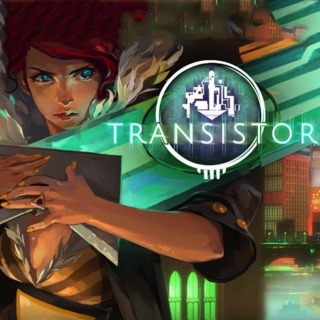Transistor doesn't start with a big introductory cut-scene or any kind of immediate lore dump. As you progress, numbers fly around ranging from your damage counter to how many secret dips were taken in a public fountain. Developer Supergiant Games isn't shy about a noticeable HUD and they made a science fiction world that is transparently digital. In short, Transistor makes itself clear that it is a game. However, it is this openness and purity of design that makes it beautiful. Transistor is a wonderful example of the language of video games.
The little information that is given to you in the early parts of the game is that you play as Red, you are being pursued by a technology called the Process, and you have obtained a mysterious sword called the Transistor. A character, an enemy, and a weapon. These are the core ingredients to most games and Supergiant makes sure they are all developed, each one contributing to the others. Red has no voice so her actions are her character, diminishing barriers that could get in the way of player agency. The Transistor has a voice but is controlled entirely by Red, making sure it never does anything that would break immersion like AI partners so often do. The Process gives the duo targets to interact with, but defeating units uncovers bits of information about them. They're AI in fiction and reality so they never misbehave.
The Transistor gives Red the power to halt time and plan out her actions exactly as she means to. Each attack can be assigned to a face button for easy access in real time but the ability to pause and make a plan of attack becomes invaluable. One attack may soften an enemy up for the next but the real value comes in lining targets up in a single hit and the rapid execution after Red picks her moves. However, executing a plan makes Red unable to do much beyond running away until her powers charge back up which makes for a natural turn based structure to battles that seem to be in real time. This ebb and flow to combat creates an incentive to defeat the Process with exactly as many attacks as is needed and no more. Otherwise, the cells each unit leaves behind after defeat will respawn and lead to even more enemies.
This incredibly sensible take on turn-based combat is only one way that Supergiant Games breaks down genre barriers. At one point the Transistor quips at how illogical it is to send goons to stop Red when defeating them only serves to make her more powerful. From there on, Red can start to equip limiters that make enemies more challenging but give up greater rewards. The fine tuning is so precise that even small rough edges that most developers take for granted have been polished out. It's fine craftsmanship and it takes away just that much more of the abstraction present in roleplaying games.
Supergiant's attention to genre and mechanics ensure that Transistor never gets bogged down with ideas that can't fit into its design. The ability Red gets from her weapon to stop time and command her surroundings isn't just a genre concession; it's a facet of the game world. Valve's Half-Life so often gets praised for how it tells its story without breaking perspective or taking control away from the player. Transistor skirts that line with autonomy and (for the most part) perspective, but the real hook that makes everything so immediate and believable is how the mechanics and choice of genre become part of the storytelling as well. You'll hear audio logs in Transistor, but the mechanics speak too.

